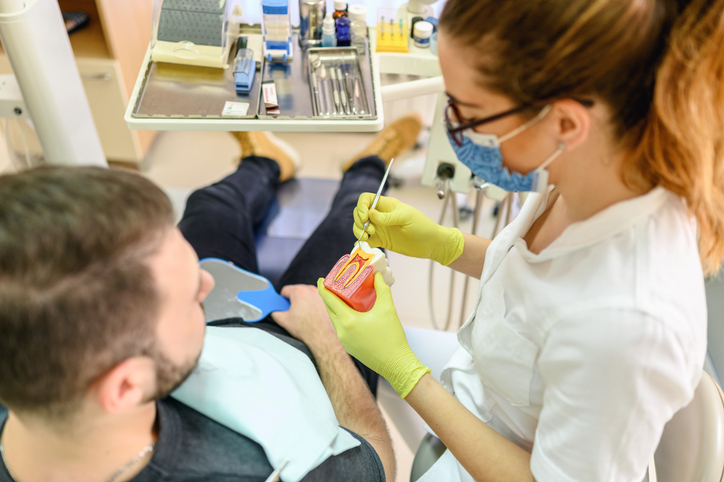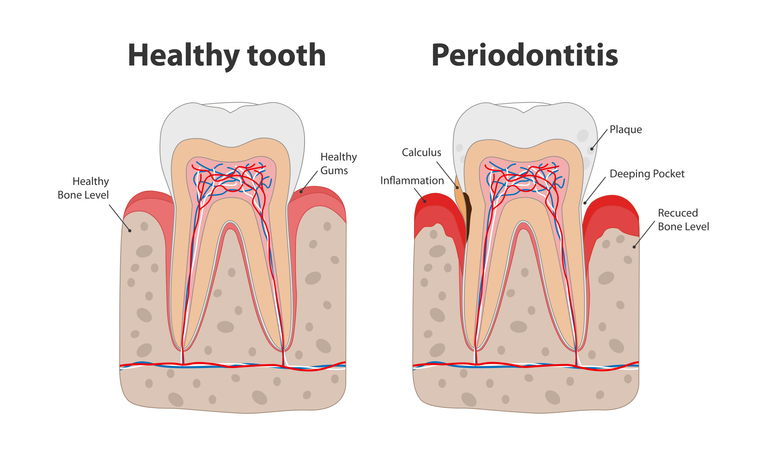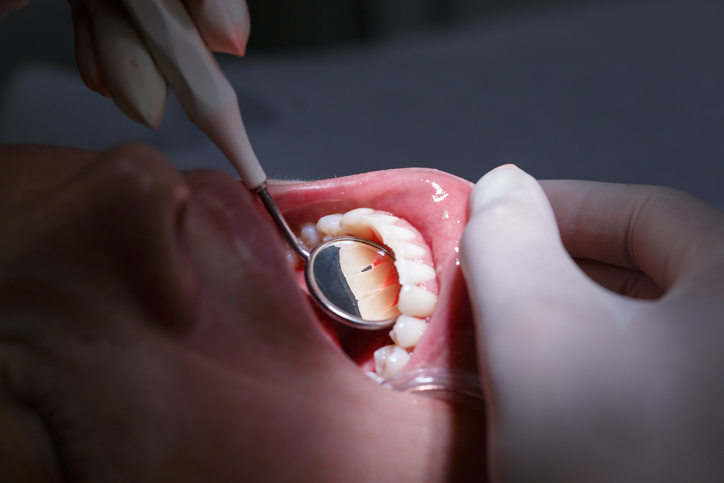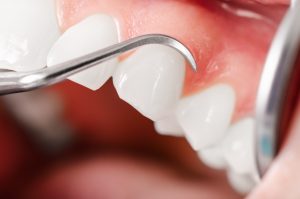Periodontal disease, also known as gum disease, is one of the most common yet preventable oral health conditions affecting adults today. It develops when bacteria in dental plaque cause inflammation and infection of the gums. In its earliest stage, known as gingivitis, patients may notice mild bleeding when brushing or flossing, along with red or swollen gums. If left untreated, gingivitis can progress into periodontitis, a more serious condition that affects the supporting bone and tissues that hold the teeth in place. Over time, this can lead to gum recession, bone loss, and even tooth loss.
At Pinnacle Center Dental Implants and Periodontics, we emphasize the importance of recognizing early signs of periodontal disease. When identified early, gum disease can often be treated successfully without surgery, helping patients maintain a healthy and confident smile.
The Importance of Treating Gum Disease
Healthy gums provide the foundation for a strong, beautiful smile. When gum tissue becomes inflamed or infected, it can compromise the stability of your teeth and affect your overall well-being. Periodontal disease has been linked to several systemic health conditions, including heart disease, diabetes, stroke, and respiratory illness. The bacteria associated with gum infection can enter the bloodstream and contribute to inflammation in other parts of the body.
Treating periodontal disease is not just about preserving your teeth. It is an important part of maintaining your long-term health. By addressing the infection and preventing further tissue damage, you can reduce inflammation throughout your body and improve your oral and general health.
Common Treatment Options for Periodontal Disease
At Pinnacle Center Dental Implants and Periodontics, Dr. Katherine L. Roll and Dr. Kelly B. Williams provide a full range of periodontal treatments. Every patient’s condition is unique, so we tailor each plan based on the severity of the disease, the patient’s oral health history, and their personal goals for care.
1. Scaling and Root Planing
Scaling and root planing is a deep-cleaning procedure used to treat mild to moderate gum disease. During scaling, plaque and hardened tartar are removed from above and below the gumline. Root planing smooths the root surfaces, making it more difficult for bacteria to accumulate and helping the gums reattach to the teeth. This treatment can significantly reduce inflammation, stop disease progression, and promote healing of the gum tissue. Patients often notice less bleeding and swelling after the procedure.
2. Antibiotic Therapy
Antibiotics may be prescribed to eliminate harmful bacteria that cause infection. These can be administered as topical gels applied directly to the gums or as oral medications. Antibiotic therapy is often used in combination with scaling and root planing to improve results and prevent reinfection. By reducing the bacterial load, antibiotics support the body’s natural healing process and help stabilize gum health.
3. Periodontal Surgery
In more advanced cases of periodontitis, surgical treatment may be required to restore gum and bone health. Periodontal surgery allows the doctor to access deep pockets of infection that cannot be effectively cleaned through non-surgical means. Common procedures include:
- Osseous surgery, which involves reshaping the bone around the teeth to remove bacteria and reduce periodontal pockets. This procedure helps create a smoother surface that is easier to keep clean and promotes better gum attachment.
- Bone grafting, used to rebuild areas of bone loss caused by gum disease. This helps restore the foundation needed to support teeth and dental implants.
- Soft tissue grafts, which use tissue from another area of the mouth or a donor source to cover exposed roots and strengthen thin or receding gums.
These procedures help reduce pocket depth, eliminate infection, and create a more stable environment for long-term oral health.
4. Maintenance and Ongoing Care
After initial treatment, periodontal maintenance is critical to prevent recurrence. Regular maintenance appointments are typically scheduled every three to four months, depending on your condition. During these visits, the periodontist carefully monitors gum health, removes plaque buildup, and checks for early signs of disease activity. Good home care habits, including daily brushing and flossing, also play a vital role in keeping your gums healthy. Consistency with these follow-up visits and oral hygiene routines can make a lasting difference in the success of treatment.
How to Recognize the Signs of Gum Disease
Periodontal disease can develop slowly and may not cause pain until it becomes advanced. Recognizing the early warning signs is key to getting timely treatment. Symptoms may include:
- Red, swollen, or tender gums
- Bleeding when brushing or flossing
- Receding gums or teeth that appear longer
- Persistent bad breath or a bad taste in the mouth
- Loose or shifting teeth
- Changes in how your teeth fit together when you bite
If you notice any of these symptoms, it is important to schedule an evaluation. Early intervention can prevent the need for more invasive procedures later.
Personalized Gum Care
Every smile is different, and so are the causes and effects of periodontal disease. Dr. Katherine L. Roll and Dr. Kelly B. Williams take the time to understand each patient’s needs and goals before recommending treatment. By using advanced diagnostic tools and a patient-centered approach, they ensure that every aspect of care is precise, comfortable, and effective.
At Pinnacle Center Dental Implants and Periodontics, patients benefit from a combination of clinical expertise and compassionate care. Our team focuses on providing treatments that not only manage periodontal disease but also help patients achieve long-term stability and confidence in their oral health. We are proud to provide comprehensive periodontal services, including dental implants, gum grafting, and bone regeneration procedures.
Schedule Your Consultation Today
If you are experiencing symptoms such as bleeding gums, persistent bad breath, or loose teeth, do not wait to seek care. Periodontal disease is most manageable in its early stages, and prompt treatment can help preserve your natural teeth and protect your health.
Contact us today to schedule a consultation with Dr. Roll or Dr. Williams. Our team will perform a thorough evaluation and design a personalized plan to restore and maintain your gum health.



 Periodontal disease, more commonly known as gum disease, is a serious oral health condition that affects millions of Americans every year. Often referred to as a “silent disease,” it can progress slowly and without pain—until it’s too late. At Pinnacle Center Dental Implants and Periodontics, our experienced periodontists,
Periodontal disease, more commonly known as gum disease, is a serious oral health condition that affects millions of Americans every year. Often referred to as a “silent disease,” it can progress slowly and without pain—until it’s too late. At Pinnacle Center Dental Implants and Periodontics, our experienced periodontists,  Did you know that nearly half of American adults suffer from some form of gum disease? This surprising statistic underscores the importance of periodontal health. At Pinnacle Center Dental Implants and Periodontics, we believe in the power of regular periodontal therapy to maintain not only your smile but also your overall well-being. Today, we will explore the significant benefits of
Did you know that nearly half of American adults suffer from some form of gum disease? This surprising statistic underscores the importance of periodontal health. At Pinnacle Center Dental Implants and Periodontics, we believe in the power of regular periodontal therapy to maintain not only your smile but also your overall well-being. Today, we will explore the significant benefits of  Gum disease, also known as periodontal disease, is a common yet serious condition that affects many individuals around the world. It’s caused by the buildup of plaque, a sticky film of bacteria that forms on the teeth. If not properly managed, plaque can harden into tartar, leading to inflammation of the gum tissues, which can progress to more severe
Gum disease, also known as periodontal disease, is a common yet serious condition that affects many individuals around the world. It’s caused by the buildup of plaque, a sticky film of bacteria that forms on the teeth. If not properly managed, plaque can harden into tartar, leading to inflammation of the gum tissues, which can progress to more severe 




